11 aug 2015
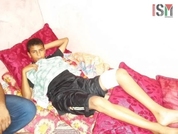
Maher Shitat, 13 years old, was shot in the leg on Friday night (8 aug) by the occupation forces.
His father sent him to bring his brother from a relative’s home and on the way there the soldiers shot him without previous advice. He was shot in El Zeraa area, in Beit Hanoun, at 8pm. He was walking at 500m from the fence when he was shot, on a frequently used road.
He was first taken to Beit Hanoun Hospital, where due to the lack of medical equipment the doctors where unable to treat him. After that he was transferred to Kamal Adwan Hospital, where the doctors decided not to remove the bullet, as they said it’s located very near to a vein, and removing it would most probably end up with his leg amputated.
Now they are trying to stabilize his condition. After a while they hope he will be able to walk again, and after 15 years, when his leg and veins are stronger, they’ll try to remove the bullet.
For the moment Maher is not allowed to walk, so he spends his days lying on a mattress.
His mother explains: “he is very afraid… he doesn’t want to speak and today spent more than 30 minutes just shaking.”
Maher on the matress in is his home.
But as his family says, that’s not just because of this attack. During the last aggression his home was bombed, his cousin was killed and his father was injured in the leg.
Maher’s father’s scarred leg.
They were not at home when it was bombed, they were already at the UNRWA shelter/school, but they were at home when the one next to theirs was bombed. Since that day Maher’s family says that his personality has changed. They think he has a trauma. In his short life Maher has already suffered 3 massive Zionist aggressions against the Gaza Strip.
Her mother explains that since the last massacre, and until now, he can’t go alone to the bathroom, as he is afraid the zionist soldiers will be inside.
She also explains how Maher and his brothers ask her all the time why the Israelis want to kill them, and that they keep crying because they don’t want to die.
The psychological effect of those aggressions are obvious on Maher, as on most of Gaza’s children, before the last massacre he had always been one of the first in his class, but this year he had very bad results in his exams and will have to repeat the course.
His father sent him to bring his brother from a relative’s home and on the way there the soldiers shot him without previous advice. He was shot in El Zeraa area, in Beit Hanoun, at 8pm. He was walking at 500m from the fence when he was shot, on a frequently used road.
He was first taken to Beit Hanoun Hospital, where due to the lack of medical equipment the doctors where unable to treat him. After that he was transferred to Kamal Adwan Hospital, where the doctors decided not to remove the bullet, as they said it’s located very near to a vein, and removing it would most probably end up with his leg amputated.
Now they are trying to stabilize his condition. After a while they hope he will be able to walk again, and after 15 years, when his leg and veins are stronger, they’ll try to remove the bullet.
For the moment Maher is not allowed to walk, so he spends his days lying on a mattress.
His mother explains: “he is very afraid… he doesn’t want to speak and today spent more than 30 minutes just shaking.”
Maher on the matress in is his home.
But as his family says, that’s not just because of this attack. During the last aggression his home was bombed, his cousin was killed and his father was injured in the leg.
Maher’s father’s scarred leg.
They were not at home when it was bombed, they were already at the UNRWA shelter/school, but they were at home when the one next to theirs was bombed. Since that day Maher’s family says that his personality has changed. They think he has a trauma. In his short life Maher has already suffered 3 massive Zionist aggressions against the Gaza Strip.
Her mother explains that since the last massacre, and until now, he can’t go alone to the bathroom, as he is afraid the zionist soldiers will be inside.
She also explains how Maher and his brothers ask her all the time why the Israelis want to kill them, and that they keep crying because they don’t want to die.
The psychological effect of those aggressions are obvious on Maher, as on most of Gaza’s children, before the last massacre he had always been one of the first in his class, but this year he had very bad results in his exams and will have to repeat the course.
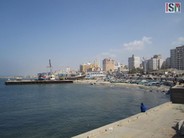
Two days ago, on Sunday’s night at 3am, the occupation forces kidnapped fishermen Mohamed Ismail Sharafi, 34 years old, and Mohamed Saidi, 22 years old, in Gaza City waters.
According to the testimony of the other fishermen that where working with them the night of the attack, around 10 boats, one of the two fishermen was injured by live ammunition before being kidnapped.
The aggression took place at 5 miles off shore and their boat was also taken to Ashdod.
Two weeks ago Ahmed Sharafi, Mohamed’s brother, was shot in his back with live ammunition while working with his father.
Since the end of the last Zionist massacre against Gaza there have been 1312 reported attacks against the fishermen.
Since then, 22 boats have been stolen; 26 fishermen have been injured; one fisherman, Tawfiq Abu Riela, has been assassinated; 28 boats have been disabled by bullet fire; 2 big fishing boats have been sunken by rocket fire, one in Deir El Balah at 300m from the coast and one in Gaza City at 5 miles; 51 fishermen have been kidnapped while working and 3 fishermen remain prisoners until now.
Those facts, among other practices of the occupation forces, have caused the quantity of fish caught to decrease from 1600 tons the year before the massacre to 1000 tons the year after. At the same time the number of fishermen who work in the Gaza Strip has decreased from 3000 to 1000 and the fishermen who keep working have seen how their monthly income decreased from 2000 ILS to the actual 100 ILS.
This last year, just in Beach Camp, 50 children of fishermen have left the school in order to work carrying flour sacks at the doors of UNRWA for 1 ILS each sack.
It’s becoming something common that the fishermen families have to choose between their children and decide which ones will go to school and which ones will have to work in order to support the family.
In this moment there are 900 children of fishermen in Gaza City, and 1700 in all the Strip, that should start the academic year in 20 days and whose parents can’t afford to buy them the school materials.
According to the testimony of the other fishermen that where working with them the night of the attack, around 10 boats, one of the two fishermen was injured by live ammunition before being kidnapped.
The aggression took place at 5 miles off shore and their boat was also taken to Ashdod.
Two weeks ago Ahmed Sharafi, Mohamed’s brother, was shot in his back with live ammunition while working with his father.
Since the end of the last Zionist massacre against Gaza there have been 1312 reported attacks against the fishermen.
Since then, 22 boats have been stolen; 26 fishermen have been injured; one fisherman, Tawfiq Abu Riela, has been assassinated; 28 boats have been disabled by bullet fire; 2 big fishing boats have been sunken by rocket fire, one in Deir El Balah at 300m from the coast and one in Gaza City at 5 miles; 51 fishermen have been kidnapped while working and 3 fishermen remain prisoners until now.
Those facts, among other practices of the occupation forces, have caused the quantity of fish caught to decrease from 1600 tons the year before the massacre to 1000 tons the year after. At the same time the number of fishermen who work in the Gaza Strip has decreased from 3000 to 1000 and the fishermen who keep working have seen how their monthly income decreased from 2000 ILS to the actual 100 ILS.
This last year, just in Beach Camp, 50 children of fishermen have left the school in order to work carrying flour sacks at the doors of UNRWA for 1 ILS each sack.
It’s becoming something common that the fishermen families have to choose between their children and decide which ones will go to school and which ones will have to work in order to support the family.
In this moment there are 900 children of fishermen in Gaza City, and 1700 in all the Strip, that should start the academic year in 20 days and whose parents can’t afford to buy them the school materials.
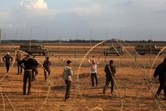
The Israeli Occupation Forces (IOF) opened their machine gun fire towards three Palestinian youths near the border fence east of Deir al-Balah in Gaza Strip on Monday night. No causalities were reported during the armed attack.
The shooting was accompanied with heavy flight of Israeli aircraft over the area, while Israeli troops intensified movement along the border fence, the PIC reporter said. No injuries or arrests were reported.
Meanwhile, IOF fired live rounds and firebombs towards Palestinian agricultural lands in the Central Province in Gaza Strip.
Israeli military sources claimed that firebombs were fired near their military sites along the eastern border areas.
Palestinian farmers in Gaza are subjected to almost daily shootings at the hands of Israeli forces stationed along the border fence in an attempt to prevent their agricultural work.
In the West Bank, the IOF soldiers arrested Monday evening a Palestinian boy after severely beating him along with a group of boys in Takoa town in Bethlehem.
Locals told a PIC reporter that Israeli forces violently attacked the boys for allegedly being involved in stone-throwing attack against settlers’ vehicles.
One of the boys was arrested during the attack, the sources added.
The shooting was accompanied with heavy flight of Israeli aircraft over the area, while Israeli troops intensified movement along the border fence, the PIC reporter said. No injuries or arrests were reported.
Meanwhile, IOF fired live rounds and firebombs towards Palestinian agricultural lands in the Central Province in Gaza Strip.
Israeli military sources claimed that firebombs were fired near their military sites along the eastern border areas.
Palestinian farmers in Gaza are subjected to almost daily shootings at the hands of Israeli forces stationed along the border fence in an attempt to prevent their agricultural work.
In the West Bank, the IOF soldiers arrested Monday evening a Palestinian boy after severely beating him along with a group of boys in Takoa town in Bethlehem.
Locals told a PIC reporter that Israeli forces violently attacked the boys for allegedly being involved in stone-throwing attack against settlers’ vehicles.
One of the boys was arrested during the attack, the sources added.
10 aug 2015
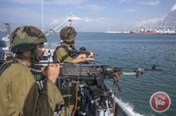
Israeli naval forces on Monday morning, detained two Palestinian fishermen off the coast of Gaza City, the secretary-general of Gaza's fishing union said.
Amjad al-Shirafi told Ma'an that the fishermen were identified as Muhammad al-Shirafi and Muhammad al-Saedi.
He said that Israeli gunboats approached their fishing boats while they were sailing within the six nautical mile fishing zone.
An Israeli army spokeswoman said she was "looking into the incident".
Palestinian fishermen face daily risks in order to make a living, including routine harassment from Israeli naval forces, confiscation of boats and materials, detention, and potentially death.
At least three Palestinian fishermen have been shot dead by Israeli forces since last September.
Israeli forces often allege that fishermen deviate from the designated fishing zone and pose a security threat. Israel promised last year to extend the fishing zone to six nautical miles as part of the ceasefire that ended last summer's devastating Gaza war.
However, the zone's exact limits remain ambiguous and rights groups say Israeli authorities have not respected the agreement.
Amjad al-Shirafi told Ma'an that the fishermen were identified as Muhammad al-Shirafi and Muhammad al-Saedi.
He said that Israeli gunboats approached their fishing boats while they were sailing within the six nautical mile fishing zone.
An Israeli army spokeswoman said she was "looking into the incident".
Palestinian fishermen face daily risks in order to make a living, including routine harassment from Israeli naval forces, confiscation of boats and materials, detention, and potentially death.
At least three Palestinian fishermen have been shot dead by Israeli forces since last September.
Israeli forces often allege that fishermen deviate from the designated fishing zone and pose a security threat. Israel promised last year to extend the fishing zone to six nautical miles as part of the ceasefire that ended last summer's devastating Gaza war.
However, the zone's exact limits remain ambiguous and rights groups say Israeli authorities have not respected the agreement.
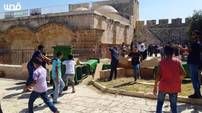
Israeli occupation forces assaulted and injured guards at the Al Aqsa Mosque, Monday morning, at the door of al-Asbat, while detaining one other.
The media coordinator of the Foundation of the Islamic Waqf in Jerusalem, Firas al-Debs, told Al Ray Palestinian Media Agency that Israeli forces pepper-sprayed a group of children and beat them when they tried to enter the mosque to participate in summer camp.
Al-Debs added that soldiers beat the guards severely when they tried to protect the children, injuring four of them.
He pointed out that guard forces arrested Moayad Hashem after assaulting him, and took him to an unknown destination.
He said that around 25 settlers stormed the courtyards of Al-Aqsa in the morning hours, under the protection of Israeli police.
Al-Debs explained that worshipers inside the mosque confronted settler incursions with chanting and expelled them outside of the courtyards.
The media coordinator of the Foundation of the Islamic Waqf in Jerusalem, Firas al-Debs, told Al Ray Palestinian Media Agency that Israeli forces pepper-sprayed a group of children and beat them when they tried to enter the mosque to participate in summer camp.
Al-Debs added that soldiers beat the guards severely when they tried to protect the children, injuring four of them.
He pointed out that guard forces arrested Moayad Hashem after assaulting him, and took him to an unknown destination.
He said that around 25 settlers stormed the courtyards of Al-Aqsa in the morning hours, under the protection of Israeli police.
Al-Debs explained that worshipers inside the mosque confronted settler incursions with chanting and expelled them outside of the courtyards.
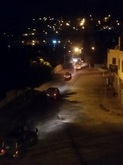
Two Palestinian young men at dawn Monday suffered injuries during violent clashes in Nablus city with invading Israeli troops, who were escorting Jewish settlers to the mausoleum of Joseph.
Local sources told the Palestinian Information Center (PIC) that dozens of settlers escorted by a large number of soldiers invaded the city at the pretext of performing rituals in the mausoleum.
They added that the unwelcome presence of soldiers and settlers in the eastern part of the city, where the tomb is located, provoked the anger of the local young men, who hurled stones at them.
Local sources told the Palestinian Information Center (PIC) that dozens of settlers escorted by a large number of soldiers invaded the city at the pretext of performing rituals in the mausoleum.
They added that the unwelcome presence of soldiers and settlers in the eastern part of the city, where the tomb is located, provoked the anger of the local young men, who hurled stones at them.
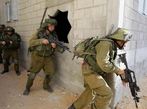
Israeli soldiers kidnapped, earlier on Monday, two Palestinians in the northern West Bank city of Jenin, and one Palestinian near the southern West Bank district of Hebron.
Media sources in Jenin said the soldiers invaded homes in Jabal Abu Thheir neighborhood, and searched them before kidnapping two Palestinians identified as Jihad Mohammad ‘Arqawy, 26, and Ahmad Khairi Khalaf, 25 years of age.
The soldiers also interrogated a number of Palestinians in the invaded homes; two of them have been identified as Mohammad an-Nasra and his son Hani.
In addition, soldiers invaded Bani Neim town, east of Hebron, and kidnapped Walid Mohammad Ziyadat, after violently searching his home.
The army also invaded various neighborhoods in Hebron city, installed roadblocks on the main entrances of Sa’ir and Halhoul towns, before stopping and searching dozens of cars, and interrogated many residents while inspecting their ID cards.
In Bethlehem, soldiers invaded the Deheishe refugee camp, south of the city, and handed Karam Nasri Abedrabbo a military order for interrogation in the Etzion military base, south of Bethlehem.
The invasion into the refugee camp led to clashes between local youths and the soldiers; the army fired gas bombs and concussion grenades, causing many Palestinians to suffer the effects of teargas inhalation.
Media sources in Jenin said the soldiers invaded homes in Jabal Abu Thheir neighborhood, and searched them before kidnapping two Palestinians identified as Jihad Mohammad ‘Arqawy, 26, and Ahmad Khairi Khalaf, 25 years of age.
The soldiers also interrogated a number of Palestinians in the invaded homes; two of them have been identified as Mohammad an-Nasra and his son Hani.
In addition, soldiers invaded Bani Neim town, east of Hebron, and kidnapped Walid Mohammad Ziyadat, after violently searching his home.
The army also invaded various neighborhoods in Hebron city, installed roadblocks on the main entrances of Sa’ir and Halhoul towns, before stopping and searching dozens of cars, and interrogated many residents while inspecting their ID cards.
In Bethlehem, soldiers invaded the Deheishe refugee camp, south of the city, and handed Karam Nasri Abedrabbo a military order for interrogation in the Etzion military base, south of Bethlehem.
The invasion into the refugee camp led to clashes between local youths and the soldiers; the army fired gas bombs and concussion grenades, causing many Palestinians to suffer the effects of teargas inhalation.
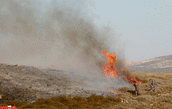
A number of Israeli extremists invaded, Sunday, Palestinian agricultural lands, in Burin village, south of the northern West Bank city of Nablus, and set them ablaze.
Eyewitnesses said that attackers fled to nearby illegal colonies, especially after the villagers noticed the fire and rushed to extinguish it.
Palestinian firefighters arrived at the scene, before Israeli soldiers attacked them and the locals, and fired several gas bombs and concussion grenades, causing additional fires in nearby lands.
Settlers torch hundreds of dunums in southern Nablus
Jewish settlers burned hundreds of dunums of pastoral lands in different locations to the south of Nablus city on Sunday evening.
The activist Zakariya al-Siddeh told the PIC reporter that settlers of Arosah settlement set fire to 15 dunums of pastoral lands in a district to the east of Borin town.
Palestinians along with civil defense vehicles hastened to extinguish the fire but settlers hindered the process leading to the spread of fire to the adjacent areas.
Eyewitnesses revealed that the fire spread very quickly and caught hundreds of dunums in the two nearby towns called Iraq Borin and Enabous.
Groups of settlers were deployed over mountains’ tops under protection of Israeli forces and tried to prevent civil defense cars from reaching fire locations.
Meanwhile, clashes erupted between Palestinian citizens and Israeli soldiers who protected settlers and fired rubber bullets and tear gas at the civilians. A number of youths suffered suffocation and received treatment in the field.
Eyewitnesses said that attackers fled to nearby illegal colonies, especially after the villagers noticed the fire and rushed to extinguish it.
Palestinian firefighters arrived at the scene, before Israeli soldiers attacked them and the locals, and fired several gas bombs and concussion grenades, causing additional fires in nearby lands.
Settlers torch hundreds of dunums in southern Nablus
Jewish settlers burned hundreds of dunums of pastoral lands in different locations to the south of Nablus city on Sunday evening.
The activist Zakariya al-Siddeh told the PIC reporter that settlers of Arosah settlement set fire to 15 dunums of pastoral lands in a district to the east of Borin town.
Palestinians along with civil defense vehicles hastened to extinguish the fire but settlers hindered the process leading to the spread of fire to the adjacent areas.
Eyewitnesses revealed that the fire spread very quickly and caught hundreds of dunums in the two nearby towns called Iraq Borin and Enabous.
Groups of settlers were deployed over mountains’ tops under protection of Israeli forces and tried to prevent civil defense cars from reaching fire locations.
Meanwhile, clashes erupted between Palestinian citizens and Israeli soldiers who protected settlers and fired rubber bullets and tear gas at the civilians. A number of youths suffered suffocation and received treatment in the field.
9 aug 2015
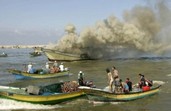
Israeli naval boats, Sunday, opened machine gunfire on Palestinian fishing boats offshore the city of Gaza, according to WAFA correspondence.
Israeli naval boats opened machine gunfire on fishing boats sailing within the unilaterally-imposed six-nautical-mile fishing zone offshore al-Sudaniyya area, to the northwest of Gaza city.
No injuries were reported among the fishermen, who were forced to leave the sea for fear of being arrested, injured, or killed.
This attack on fishermen came only a day after Israeli forces shot and injured a Palestinian minor to the east of Beit Hanoun, in the northern Gaza Strip.
Sources said that Palestinian Maher Shtat, 14, was hit with a live bullet fired by Israeli forces stationed at watchtowers at the borderline to the north of the strip. Shtat was transferred to hospital for medical treatment.
Meanwhile, At least four Palestinians were killed and some 30 others injured on August 6th when an unexploded device left behind the Israeli army detonated in the southern Gaza Strip city of Rafah.
Israeli navy and troops routinely open fire on Palestinian fishermen sailing within the six-nautical-miles zone and farmlands along the border, flagrantly violating the ceasefire deal that was reached in August 2014.
The current six-nautical-mile fishing zone falls drastically short of the twenty nautical miles allocated to Palestinian fishermen in the 1993 Oslo Accords.
Meanwhile, the Palestinian Center for Human Rights (PCHR) documented during June alone 10 shooting incidents that resulted in the wounding of four Palestinian fishermen while sailing off Beit Lahia shore, in the northern Gaza Strip.
Noting the lack of Israeli naval forces’ compliance with the ceasefire agreement concluded between Israel and Palestinian armed groups, under Egyptian auspices, on 26 August, 2014, including the allowance of Palestinian fishermen to sail within six nautical miles in the Gaza Sea, PCHR reported that all attacks took place within the distance of six nautical miles, which it said, “proves that Israeli forces' policies aim to tighten restrictions on the Gaza Strip's fishermen and their livelihoods.”
Israel has imposed a tightened blockade since 2007 after Hamas won the democratic legislative election and took over power in the Strip.
Israeli naval boats opened machine gunfire on fishing boats sailing within the unilaterally-imposed six-nautical-mile fishing zone offshore al-Sudaniyya area, to the northwest of Gaza city.
No injuries were reported among the fishermen, who were forced to leave the sea for fear of being arrested, injured, or killed.
This attack on fishermen came only a day after Israeli forces shot and injured a Palestinian minor to the east of Beit Hanoun, in the northern Gaza Strip.
Sources said that Palestinian Maher Shtat, 14, was hit with a live bullet fired by Israeli forces stationed at watchtowers at the borderline to the north of the strip. Shtat was transferred to hospital for medical treatment.
Meanwhile, At least four Palestinians were killed and some 30 others injured on August 6th when an unexploded device left behind the Israeli army detonated in the southern Gaza Strip city of Rafah.
Israeli navy and troops routinely open fire on Palestinian fishermen sailing within the six-nautical-miles zone and farmlands along the border, flagrantly violating the ceasefire deal that was reached in August 2014.
The current six-nautical-mile fishing zone falls drastically short of the twenty nautical miles allocated to Palestinian fishermen in the 1993 Oslo Accords.
Meanwhile, the Palestinian Center for Human Rights (PCHR) documented during June alone 10 shooting incidents that resulted in the wounding of four Palestinian fishermen while sailing off Beit Lahia shore, in the northern Gaza Strip.
Noting the lack of Israeli naval forces’ compliance with the ceasefire agreement concluded between Israel and Palestinian armed groups, under Egyptian auspices, on 26 August, 2014, including the allowance of Palestinian fishermen to sail within six nautical miles in the Gaza Sea, PCHR reported that all attacks took place within the distance of six nautical miles, which it said, “proves that Israeli forces' policies aim to tighten restrictions on the Gaza Strip's fishermen and their livelihoods.”
Israel has imposed a tightened blockade since 2007 after Hamas won the democratic legislative election and took over power in the Strip.
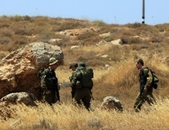
A Palestinian child was seriously injured, sunday, after an unexploded ordnance (UXO) left behind by the Israeli army exploded in the city of Hebron, according to a police statement.
The statement said that the injury was caused by the explosion of a "suspicious device" a child found and was playing with near one of the Israeli military camps in Hebron. The object exploded in the child’s face, causing him injuries and burned his hands and body.
The child, whose identity remains unidentified, was transferred to hospital for treatment, where his condition was described as serious.
According to WAFA correspondence, police officials asked all Palestinian families to warn their children about playing with suspicious objects and to immediately inform the authorities.
On August 6, four Palestinians were killed and around 30 others injured when an unexploded device left behind the Israeli army detonated in the southern Gaza Strip city of Rafah.
The Israeli army usually conducts drills in the occupied West Bank, especially in the Jordan Valley, after forcefully displacing dozens of local Palestinian families due to the proximity of their homes to the training sites.
Palestinians living in these areas have to also worry about unexploded ordnance left behind by the Israeli army after the drills, which have led to the death of many Palestinians, including children, over the past years.
In 2014, three Palestinians were killed because of unexploded ordnance left by Israeli forces in the West Bank's Jordan Valley, while Gaza remains plagued with unexploded ordnance following the most recent Israeli aggression.
The statement said that the injury was caused by the explosion of a "suspicious device" a child found and was playing with near one of the Israeli military camps in Hebron. The object exploded in the child’s face, causing him injuries and burned his hands and body.
The child, whose identity remains unidentified, was transferred to hospital for treatment, where his condition was described as serious.
According to WAFA correspondence, police officials asked all Palestinian families to warn their children about playing with suspicious objects and to immediately inform the authorities.
On August 6, four Palestinians were killed and around 30 others injured when an unexploded device left behind the Israeli army detonated in the southern Gaza Strip city of Rafah.
The Israeli army usually conducts drills in the occupied West Bank, especially in the Jordan Valley, after forcefully displacing dozens of local Palestinian families due to the proximity of their homes to the training sites.
Palestinians living in these areas have to also worry about unexploded ordnance left behind by the Israeli army after the drills, which have led to the death of many Palestinians, including children, over the past years.
In 2014, three Palestinians were killed because of unexploded ordnance left by Israeli forces in the West Bank's Jordan Valley, while Gaza remains plagued with unexploded ordnance following the most recent Israeli aggression.
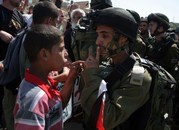
A number of Palestinians got injured at noon on Saturday during the quelling of a peaceful march at the hands of Israeli Occupation Forces (IOF) in northern al-Khalil.
Local sources revealed that the march was organized by popular activists near “Bait al-Barakeh” house which is threatened of confiscation by Israel for settlement establishment. The march aimed, as well, at condemning the Israeli crime of burning and killing of the infant Ali Dawabsheh and his father in southern Nablus.
The sources added that Israeli soldiers confronted the march and assaulted participants by rifle butts leading to injuries among Palestinians.
In a similar context, the Israeli forces erected, in the morning, two military barriers and stopped a number of Palestinian cars to the south of al-Khalil, eyewitnesses told the PIC reporter.
The eyewitnesses also said that the Israeli soldiers stationed at the entrance of al-Fowwar refugee camp stopped Palestinian vehicles and blocked traffic for searching purposes.
Local sources revealed that the march was organized by popular activists near “Bait al-Barakeh” house which is threatened of confiscation by Israel for settlement establishment. The march aimed, as well, at condemning the Israeli crime of burning and killing of the infant Ali Dawabsheh and his father in southern Nablus.
The sources added that Israeli soldiers confronted the march and assaulted participants by rifle butts leading to injuries among Palestinians.
In a similar context, the Israeli forces erected, in the morning, two military barriers and stopped a number of Palestinian cars to the south of al-Khalil, eyewitnesses told the PIC reporter.
The eyewitnesses also said that the Israeli soldiers stationed at the entrance of al-Fowwar refugee camp stopped Palestinian vehicles and blocked traffic for searching purposes.
8 aug 2015

Palestinian youths got injured in clashes that erupted with Israeli forces in Duma town to the south of Nablus city in the afternoon on Saturday.
Activist, Omar Dawabsheh, told the PIC reporter that a Palestinian young man was injured by Israeli rubber bullets in the back, while a few others suffered suffocation by Israeli tear gas.
Dawabsheh disclosed that the occupation forces clashed with Palestinian citizens in the wake of the funeral of martyr Saad Dawabsheh, the father of the infant Ali Dawabsheh who was burned alive with his family in Duma.
"Israeli patrols were deployed on the main road of the town and the valley adjacent to Shilo settlement. After the funeral ended, confrontations and clashes between Israeli soldiers and Palestinians started," he explained.
Ambulances rushed to the scene and treated the wounded in the field, the activist Dawabsheh said.
Activist, Omar Dawabsheh, told the PIC reporter that a Palestinian young man was injured by Israeli rubber bullets in the back, while a few others suffered suffocation by Israeli tear gas.
Dawabsheh disclosed that the occupation forces clashed with Palestinian citizens in the wake of the funeral of martyr Saad Dawabsheh, the father of the infant Ali Dawabsheh who was burned alive with his family in Duma.
"Israeli patrols were deployed on the main road of the town and the valley adjacent to Shilo settlement. After the funeral ended, confrontations and clashes between Israeli soldiers and Palestinians started," he explained.
Ambulances rushed to the scene and treated the wounded in the field, the activist Dawabsheh said.
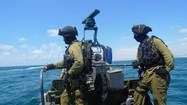
The Israeli Occupation Navy boats Saturday opened their machine gunfire on fishing boats sailing within the unilaterally-imposed six-nautical-miles fishing zone offshore Gaza Strip. No casualties were reported.
The Palestinian Interior Ministry affirmed in a brief report issued Saturday morning that Israeli navy boats targeted Palestinian fishing boats off Gaza northern shores.
The Palestinian fishing boats were forced to leave the sea. No injuries were reported.
Israeli naval boats routinely open fire on Palestinian fishermen sailing within the six-nautical-miles zone and farmlands along the border, flagrantly violating the ceasefire deal.
The Palestinian Interior Ministry affirmed in a brief report issued Saturday morning that Israeli navy boats targeted Palestinian fishing boats off Gaza northern shores.
The Palestinian fishing boats were forced to leave the sea. No injuries were reported.
Israeli naval boats routinely open fire on Palestinian fishermen sailing within the six-nautical-miles zone and farmlands along the border, flagrantly violating the ceasefire deal.
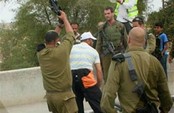
Israeli forces, Saturday, violently quelled a rally organized in condemnation of the Israeli occupation and settlers crimes against the Palestinian people, the latest of which was settlers’ arson attack against a home in Nablus which left a toddler, and his father killed and critically injured his mother and 4-year-old brother.
Protesters, including Foreign and local activists participated in the rally which was organized by popular committees against the apartheid wall and settlements, carried the Palestinian flags and chanted slogans denouncing the Israeli occupation and its policies aimed at seizing Palestinian land and property.
WAFA correspondence said that Israeli soldiers attacked the rally, beating activists with the butts of their rifles, leaving many with injuries and bruises throughout their bodies.
The rally also reportedly called to provide protection to Beit al-Baraka building located at Jerusalem-Hebron main road and which settlers claim they have previously purchased.
Protesters, including Foreign and local activists participated in the rally which was organized by popular committees against the apartheid wall and settlements, carried the Palestinian flags and chanted slogans denouncing the Israeli occupation and its policies aimed at seizing Palestinian land and property.
WAFA correspondence said that Israeli soldiers attacked the rally, beating activists with the butts of their rifles, leaving many with injuries and bruises throughout their bodies.
The rally also reportedly called to provide protection to Beit al-Baraka building located at Jerusalem-Hebron main road and which settlers claim they have previously purchased.
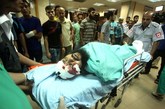
Two Palestinian policemen suffered injuries on Friday evening when an Israeli warplane bombed a training site belonging to al-Qassam Brigades of Hamas in the Gaza Strip.
A spokesman for the health ministry affirmed that two policemen sustained different wounds during an aerial attack on a resistance post in Salahuddin neighborhood near al-Bureij refugee camp.
The Israeli army claimed the air raid had been launched in response to a rocket attack from Gaza.
Spokesman for the occupation army Peter Lerner said in Twitter remarks that three Palestinian rockets were fired on Friday afternoon from the Palestinian territory towards Israel, one of them landed in an open border area inside Israel and two inside Gaza.
A spokesman for the health ministry affirmed that two policemen sustained different wounds during an aerial attack on a resistance post in Salahuddin neighborhood near al-Bureij refugee camp.
The Israeli army claimed the air raid had been launched in response to a rocket attack from Gaza.
Spokesman for the occupation army Peter Lerner said in Twitter remarks that three Palestinian rockets were fired on Friday afternoon from the Palestinian territory towards Israel, one of them landed in an open border area inside Israel and two inside Gaza.
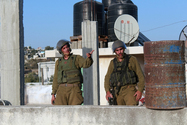
Scores of Palestinians suffered, on Friday evening, the effects of tear gas inhalation, after Israeli soldiers invaded Silwad town, east of the central West Bank city of Ramallah, and clashed with local youths. Soldiers also invaded homes near Jenin.
Medical sources said the soldiers fired dozens of gas bombs at the protesters, and at various homes in the town, causing dozens of Palestinians, including entire families, to suffer the effects of teargas inhalation.
Eyewitnesses said the soldiers invaded a home in the town, and tried to force the family out, before occupying their rooftop to use it as a firing post and a monitoring tower.
In addition, dozens of soldiers invaded Umreeha village, in the Ya’bad area, southwest of the northern West Bank city of Jenin, broke into several homes before searching them, and used their rooftops as monitoring towers.
The soldiers also interrogated the families, and several youngsters, walking nearby the invaded homes, and withdrew later; no arrests were reported.
Medical sources said the soldiers fired dozens of gas bombs at the protesters, and at various homes in the town, causing dozens of Palestinians, including entire families, to suffer the effects of teargas inhalation.
Eyewitnesses said the soldiers invaded a home in the town, and tried to force the family out, before occupying their rooftop to use it as a firing post and a monitoring tower.
In addition, dozens of soldiers invaded Umreeha village, in the Ya’bad area, southwest of the northern West Bank city of Jenin, broke into several homes before searching them, and used their rooftops as monitoring towers.
The soldiers also interrogated the families, and several youngsters, walking nearby the invaded homes, and withdrew later; no arrests were reported.
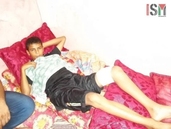
Palestinian medical sources have reported that a child was wounded, late on Friday evening, after Israeli soldiers, stationed across the border fence, opened fire on homes, east of Beit Hanoun, in the northern part of the Gaza Strip.
The sources said that Maher Shatat, 14 years of age, was shot with a live round, suffering a moderate injury, and was moved to a hospital in Beit Hanoun.
The soldiers were stationed across the border fence, in northern Gaza.
On Friday at night, five Palestinians were wounded, including one who suffered a serious injury after the army fire missiles into an area in central Gaza. .
The army claimed the targeted area was an armed resistance training ground.
The sources said that Maher Shatat, 14 years of age, was shot with a live round, suffering a moderate injury, and was moved to a hospital in Beit Hanoun.
The soldiers were stationed across the border fence, in northern Gaza.
On Friday at night, five Palestinians were wounded, including one who suffered a serious injury after the army fire missiles into an area in central Gaza. .
The army claimed the targeted area was an armed resistance training ground.
